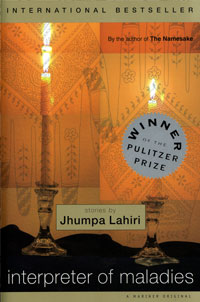
Interpreter of Maladies
by Jhumpa Lahiri
MONDAY, MARCH 14, 2022
7 – 8:30 p.m.
Synopsis
Winner of the 2000 Pulitzer Prize and PEN/Hemingway Award
Navigating between the Indian traditions they’ve inherited and the baffling new world, the characters in Jhumpa Lahiri’s elegant, touching stories seek love beyond the barriers of culture and generations. In “A Temporary Matter,” published in The New Yorker, a young Indian-American couple faces the heartbreak of a stillborn birth while their Boston neighborhood copes with a nightly blackout. In the title story, an interpreter guides an American family through the India of their ancestors and hears an astonishing confession. Lahiri writes with deft cultural insight reminiscent of Anita Desai and a nuanced depth that recalls Mavis Gallant. She is an important and powerful new voice.
(From the publisher)
Reading Group Discussion Questions
1. What kinds of marriage are presented in the stories? One reviewer has written that Lahiri’s “subject is not love’s failure,…but the opportunity that an artful spouse (like an artful writer) can make of failure…” Do you agree or disagree with that assessment?
2. Lahiri has said, “As a storyteller, I’m aware that there are limitations in communication.” What importance in the stories do miscommunication and unexpressed feelings have?
3. In “When Mr. Pirzada Came to Dine,” what does the ten-year-old Lilia learn about the differences between life in suburban America and life in less stable parts of the world? What does she learn about the personal consequences of those differences?
4. For Mrs. Sen, “Everything is there” (that is, in India). What instances are there in these stories of exile, estrangement, displacement, and marginality—both emotional, and cultural?
5. What characterizes the sense of community in both the stories set in India and stories set in the U.S.? What maintains that sense, and what disrupts it?
6. Another reviewer has written, “Food in these stories is a talisman, a reassuring bit of the homeland to cling to.” How do food and meal preparation maintain links to the characters’ homelands? What other talismans—items of clothing, for example—act as “reassuring bits of the homeland”?
7. The narrator of “The Third and Final Continent” ends his account with the statement, “Still, there are times I am bewildered by each mile I have traveled, each meal I have eaten, each person I have known, each room in which I have slept.” In what ways are Lahiri’s characters bewildered?
8. What are the roles and significance of routine and ritual in the stories? What are the rewards and drawbacks of maintaining long-established routines and ritual?
9. In “Interpreter of Maladies,” Mr. Kapasi finds it hard to believe of Mr. and Mrs. Das that “they were regularly responsible for anything other than themselves.” What instances of selfishness or self-centeredness do you find in these stories?
10. In “Interpreter of Maladies,” visitors to Konarak find the Chandrabhaga River dried up, and they can no longer enter the Temple of the Sun, “for it had filled with rubble long ago…” What other instances and images does Lahiri present of the collapse, deterioration, or passing of once-important cultural or spiritual values?
11. What does Mrs. Sen mean when, looking at the traffic that makes “her English falter,” she says to Eliot, “Everyone, this people, too much in their world”? What circumstances of life in both America and India account for people being “too much in their world”?
12. Rather than leave his weekly rent on the piano, the narrator of “The Third and Final Continent” hands it to Mrs. Croft. What similar small acts of kindness, courtesy, concern, or compassion make a difference in people’s lives?
(Questions issued by publisher.)
Additional Book Club Resources
Other Works by Jhumpa Lahiri
Novels
• The Namesake (2003)
• The Lowland (2013)
• Dove mi trovo [in Italian] (2018)
• Whereabouts [in English] (2021)
Short Story Collections
• Interpreter of Maladies (1999)
• Unaccustomed Earth (2008)
Uncollected short fiction
• “Brotherly love,” The New Yorker (June 2013)
• “The Boundary,” The New Yorker (January 2018)
• “Casting Shadows,” The New Yorker (February 2021)
If You Liked Interpreter of Maladies, may we recommend …
The God of Small Things, Arundhati Roy
The Inheritance of Loss, Kiran Desai
The White Tiger, Aravind Adiga
The Palace of Illusions, Chitra Banerjee Divakaruni
A Suitable Boy, Vikram Seth
East, West, Salman Rushdie
A Fine Balance, Rohinton Mistry
The Things Around Your Neck, Chimamanda Ngozi Adichie
Homegoing, Yaa Gyasi
Blood: Collected Stories, Noelle Q de Jesus

